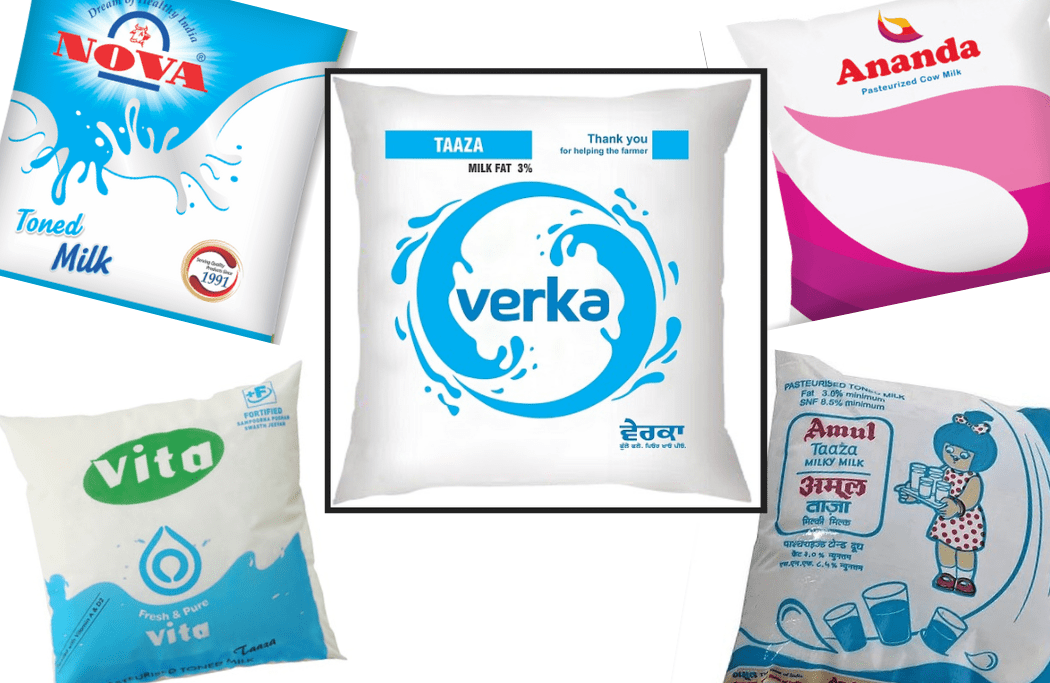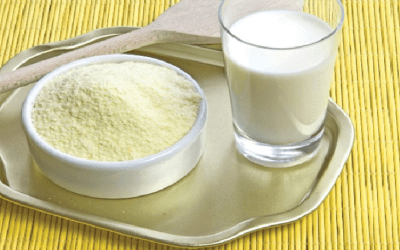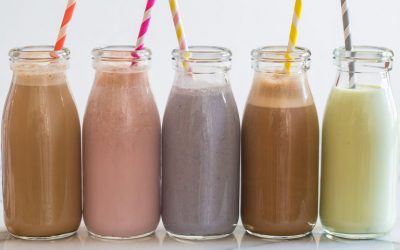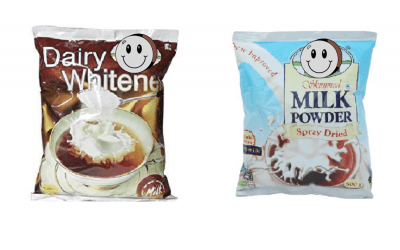Packaged Pasteurised Toned Milk

packaged milk. However, that area is too cluttered with a host of different milk brands claiming safety, purity and strength. To know what is there in such claims, we evaluated nine (9) regular selling brands of packaged pasteurised toned milk. Give this report a careful read to make your pack of milk benign as it reveals the best brand to choose from.
A Consumer Voice Report
In India, milk consumption is greater in states in- cluding Punjab, Haryana, Gujarat, Maharashtra, Karnataka, Rajasthan and Madhya Pradesh. In the packaged milk category, we have full cream milk, toned milk, double toned milk etc. Let us brush
up our knowledge about the types of milk here.
Packaged milk can be categorized according to fat and solids-not-fat (SNF) content as follows:
a) Full-cream milk: Fat 6.0 per cent and SNF 9 per cent (minimum)
b) Toned milk: Fat 3.0 per cent and SNF 8.5 per cent (minimum)
c) Double-toned milk: Fat 1.5 per cent and SNF 9 per cent (minimum)
How we test
We followed FSS Regulations and relevant Indian Standard IS: 13688 to conduct the comparative testing and evaluation of packaged pasteurised toned milk.
Did you know?
Full-cream milk means milk or a combination of buffalo or cow milk or a product prepared by combination of both that has been standardized to fat and solids-not-fat (SNF) percentage, by adjustment/addition of milk solids. It shall meet the minimum requirement of six per cent for fat and nine per cent for SNF.
Toned milk is prepared by admixture of cow or buffalo milk or both with fresh skimmed milk; or by admixture of cow or buffalo milk or both that has been standardised to fat and solids-not- fat percentage by adjustment of milk solids. It shall be pasteurised and shall show a negative Phosphatase Test.
Brands tested
The following table reflects which brand scores what and what position they secured in this compara- tive product testing.
| Rank | Score out of 100 | Brand |
MRP, Rs |
Net Quan- tity, ml | Manufactured/Marketed By |
| 1 | 94 | Verka | 24 | 500 | Ropar distt Co Operative Producers Union Ltd |
| 2 | 93 | Namaste India | 24 | 500 | NIF Pvt. Ltd |
| 3 | 92 | Nova | 24 | 500 | Sterling Agro Industries Ltd |
| 4 | 91 | Mother Dairy | 24 | 500 | Mother Dairy Fruit & Vegetable Pvt. Ltd., |
| 4 | 91 | DMS | 24 | 500 | Delhi Milk Scheme |
| 5 | 90 | Ananda | 24 | 500 | Gopaljee Dairy Foods Pvt. Ltd., |
| 5 | 90 | Vita | 24 | 500 | The Ballabgarh Co Operative Milk Producers Union Ltd |
| 6 | 89 | Paras | 24 | 500 | VRS Foods Ltd., |
| 7 | 87 | Amul | 24 | 500 | Gujarat Cooperative Milk Marketing Federation Ltd., |
Rating: >90 – Excellent *****, 71-90- Very Good ****, 51-70- Good ***, 31-50- Average **, upto 30 – Poor*
CV Recommendations
Top Performer
verka
Value for Money Brand
verka
Key findings
1. Verka scored on top and has been ranked number 1 among the brands tested followed by Namaste India and Nova.
2. In our comparative test, we have recognised Verka as the Value for Money Brand too.
3. Verka had highest fat and SNF followed by Namaste India.
4. Mother Dairy was found with highest protein content followed by Nova and DMS.
5. Namaste India was found with highest cal- cium content followed by Verka and DMS.
6. All brands of packaged milk were found free from adulteration such as Detergent, Caustic Soda, Formaldehyde and Malamine. Urea was found well within standard limit.
7. Most of the brands have just met the mini- mum requirement of 3 per cent for fat and
8.5 per cent of SNF.
8. All the brands of milk have been found within specified limits of heavy metal and microbio- logically.
9. FSSAI has prescribed microbiological safety standard for Salmonella and Listeria Mono- cytogenes at retailer level only. Other microbiological requirements should also be applicable at retailer level so that consumer get safe product.
10. Consumers are advised not to buy milk pack- ets kept in open, instead prefer to buy milk from retailers who keep it in deep freezer/ refrigerator.
COMPARATIVE PERFORMANCE (SCORE) OF PACKAGED TONED MILK
|
Brand→ Parameter↓ |
Wt. % |
Verka | Namaste India | Nova | Mother Dairy | DMS | Ananda | Vita | Paras | Amul |
| Physico- chemical Tests | ||||||||||
| Net weight | 3 | 3 | 3 | 3 | 3 | 3 | 3 | 3 | 3 | 3 |
| Milk Fat | 15 | 13.50 | 12.90 | 12.60 | 12.00 | 12.00 | 11.70 | 11.70 | 11.40 | 10.80 |
| Milk solids not fat | 12 | 10.80 | 10.56 | 8.88 | 8.64 | 8.64 | 9.36 | 9.84 | 9.36 | 9.12 |
| Protein | 10 | 8.20 | 7.20 | 8.60 | 9.20 | 8.40 | 8.20 | 7.40 | 7.80 | 6.80 |
| Calcium | 8 | 7.33 | 7.76 | 7.08 | 6.48 | 7.10 | 6.66 | 6.82 | 6.25 | 5.41 |
| Urea | 6 | 5.05 | 5.15 | 5.39 | 5.34 | 5.36 | 5.37 | 5.21 | 5.34 | 5.39 |
| Heavy Metals as lead & arsenic | 10 | 10 | 10 | 10 | 10 | 10 | 10 | 10 | 10 | 10 |
| Microbiological tests: Salmonella and Listeria Monocytogenes | 10 | 10 | 10 | 10 | 10 | 10 | 10 | 10 | 10 | 10 |
| Adulterants as Detergent, Caustic Soda, Formalin, Melamine | 15 | 15 | 15 | 15 | 15 | 15 | 15 | 15 | 15 | 15 |
| Phosphates test | 5 | 5 | 5 | 5 | 5 | 5 | 5 | 5 | 5 | 5 |
| Packing & Marking | 6 | 6 | 6 | 6 | 6 | 6 | 6 | 6 | 6 | 6 |
TEST PARAMETERS
Milk Fat
Fat is an essential part of any balanced diet, pro- viding essential fatty acids, fat-soluble vitamins and a concentrated source of energy. As per the national standards, fat content in toned milk shall not be less than three per cent by mass. All brands have met the minimum required limit of (3 per cent) of fat content. Brand Verka had highest fat content followed by Namaste India and Nova.
Milk Solids Not Fat
Milk has mainly two parts, fat and milk solids not fat (SNF). Apart from fat, all other solids such as protein, lactose, vitamins and minerals together make up SNF. It shall not be less than 8.5 per cent by mass in toned milk. All the brands have met the minimum requirement of standard. Brand Verka had highest SNF followed by Namaste India and Vita.
Protein
Milk is source of fat, protein and calcium. The national standard has not prescribed any require- ment of protein; however, protein is good for health. It helps keep your muscles strong and healthy. You need protein in your diet to help your body repair cells and make new ones. Pro- tein is also important for growth and develop- ment in children. Brand Mother Dairy has been found with highest protein content followed by Nova and DMS.
Calcium
Calcium plays an important role in building stronger, denser bones early in life and keeping bones strong and healthy later in life. Calcium deficiency can lead to rickets and poor blood clotting and osteoporosis. Milk is a well-known source of calcium therefore milk is expected to be rich in calcium content. Brand Namaste India has been found with highest calcium content fol- lowed by Verka and DMS.
Urea
Urea shall not be more than 700 ppm. Urea has been found however, all the brands were well within the standard limit.
Tests for adulteration
Although financial gain is considered to be one of the major reasons for milk adulteration, inadequate supply for the increasing popula- tion all over the world has paved the ground for this as well. All brands of milk were found free from adulteration of adulterants namely detergent, caustic soda, formalin and malamine and passed these tests by meeting the require- ments of national standards. Also, the above- mentioned adulterants were not found in all the brands tested.
Phosphatase activity
Alkaline phosphatase is an enzyme naturally present in all raw milks and is considered to be an indicator of proper milk pasteurisation. Alkaline Phosphatase test is used to indicate whether milk has been adequately pasteurised or whether it has been contaminated with raw milk after pasteurisation. All brands passed this test.
Heavy metals
Heavy metals are toxic or poisonous at high concentrations. We analysed the milk samples for presence of lead and arsenic. As per the re- quirement laid down by FSS Regulation, lead should not be more than 2 ppm and arsenic not more than 0.1 ppm.
Lead and Arsenic have been not found in all brands. Therefore all the brands passed the tests for heavy metals.
Microbiological tests
Microbiological contamination is a very serious issue for milk. Microorganisms are responsible for many food-borne diseases. FSSAI (Food regulator) has specified requirements for mi- crobiological safety for milk at market (retail) level. The safety requirements for Salmonella, Listeria monocytogenes are only applicable at retailer level.However, process hygiene criteria standards aerobic plate count and coliform count are applicable at plant level only.
We conducted tests for Salmonella and Listeria Monocytogenes. All the brands have met speci- fied limits thus safe for consumption.
Packing
Milk should be packed in food grade poly pack to retain its natural properties within its shelf life.
All brands have been properly packed in poly packs.
Marking
All the brands provided required information.
Net quantity
Net weight shall be within tolerance limits of legal metrology.
All the brands have been found as per claims.
Do Not Break the Cold Chain
A high level of microbial count in milk may be due to not maintaining cold chain during storage and transportation (below 8 degrees C) from plant to retailer as also from retailer to consumer.
Food Safety Standard Regulations and Bureau of Indian Standards (BIS) state that milk should meet the specified requirement of Aerobic count and coliform content at processing/plant level only. The fact is proper temperature needs to be maintained all the way to the delivery point – the cold chain must be maintained at 8 degrees C to avoid microbial growth. Consumers are advised to buy milk from authorised booths/retailing units of manufacturers. They should avoid buying open milk packets kept in grocery shops.
Conclusion and recommendations
We tested nine popular packaged pasteurized toned milk brands on a range of quality, safety and acceptability parameters. Milk is expected to be high in fat content as well as milk solids not fat (SNF), which is an indicator of the quality of milk. The brands have been further subjected to adulteration and safety tests i.e. detergent, urea, caustic soda, formaldehyde and melamine, microbiological tests, tests for lead and arsenic, phosphatase test. The tests have been conducted at an independent, NABL-accredited laboratory. This report will, among other things, put to rest most of our concerns about milk adulteration and contamination, and affirm or dispute the health- related claims of leading brands of packaged toned milk. It may be noted that the food regulator of India prescribes different microbiological requirements for plant level and retailer level. Based on the analysis and evaluation of all test parameters and observations brand Verka scored top among all the brands followed by Namaste India and Nova.
Consumers are advised not to buy milk packets kept in open. Buy milk from retailers who keep it in deep freezer/refrigerator.
Our advice
• For better shelf life, store the poly-packed milk below 8 degrees C.
• Consume the poly-packed milk after boiling, because boiling of milk kills the microbial load.
• Raw milk should also be boiled as early as possible.
• Tetra-packed milk is sterilized – that is, all living organisms are killed. While it is safe and does not need boiling, it is expensive for most consumers.
Boil It!
Milk is a perishable product and tends to spoil if not stored at a holding temperature below 8 degrees C. Therefore it should be boiled before consumption to prevent microbiological contamination.
A large number of people heat and re-heat the same milk again and again, and that too at a high temperature for a long time, thus killing the nutrients. According to experts, milk subjected to less heating retains its nutrient value. Experts say milk should ideally be boiled not more than twice and not for more than 2 to 3 minutes.
Basically
• Do not boil milk for extended period of
time.
• Do not leave your milk out in the open
after boiling.
• Do not heat milk repeatedly.
• Stir the milk while boiling.
• Do not use microwave ovens to heat and
re-heat milk.
• Use ultra-high-temperature milk that comes in tetra packs. It guarantees both nutrition and convenience.
Terms to Know
Pasteurisation
It is the process of heating a food, usually liquid, to a specific temperature for a definite length of time, and then cooling it immediately. This process slows microbial growth in food.
Unlike sterilisation, pasteurisation is not intended to kill all microorganisms in the food. Instead, pasteurisation aims to reduce the number of viable pathogens so they are unlikely to cause disease.
Sterilisation
Sterilisation refers to any process that eliminates (removes) or kills all forms of life, including transmissible agents (fungi, bacteria, viruses, spore forms, etc.) contained in a food, liquid, etc.
To keep milk for longer than few days at ambient temperature, it needs to be sterilised.
More recently, UHT processes have been introduced. When UHT is combined with sterile handling and container technology (such as aseptic packaging), it can even be stored unrefrigerated for 6–9 months.
Related
Dairy Whitener-Which brand stands the test?
There has been a surge in the consumption of dairy whiteners these days. Those who use them in coffee and tea find it dissolves easily and gives...
What is flavoured milk?
Flavoured milk is a ready-to- drink product, produced from milk, sugar and natural flavours (such as banana, pineapple, orange or chocolate). Milk...
What is the difference between powdered milk and dairy whitener?
There is an increase in the use of dairy whitener in tea and coffee. Those who use them find that it dissolves easily and gives your tea a very...



